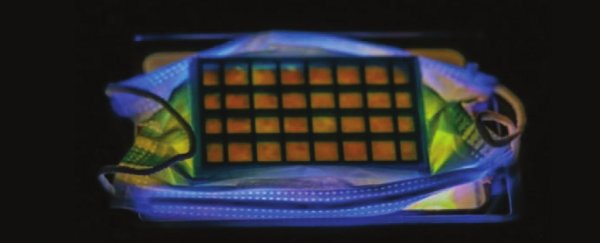The benefits of wearing face masks to help slow the spread of COVID-19 are now well understood, but scientists are still searching for better materials to use – and a filter 'paper' made up of titanium oxide nanowires is showing a lot of promise.
The new material is so good at trapping pathogens, and destroying them when ultraviolet light is applied, it could also be used in air conditioning units and ventilation systems, according to the developers.
While the nanowire-based mask looks as though it's made from regular filter paper, it brings extra antibacterial and antiviral properties to the material, making it far more effective at eliminating germs – and making it reusable, too.
"Since our filter is exceptionally good at absorbing moisture, it can trap droplets that carry viruses and bacteria," says physicist László Forró, from the Laboratory of Physics of Complex Matter at EPFL in Switzerland.
"This creates a favourable environment for the oxidation process, which is triggered by light."
The photocatalytic properties of titanium dioxide are key – when ultraviolet light hits the mask, its fibres convert moisture held in the nanowires into oxidising agents (including hydrogen peroxide), which then have the potential to destroy pathogens upon contact.
In experiments on the material, the team showed how the filter could destroy Escherichia coli bacteria and degrade strands of DNA, essentially wiping out dangerous microorganisms in the mask itself.
While standard disposable paper masks – typically made from layers of non-woven polypropylene plastic microfibre – are also effective at stopping the spread of respiratory disease, they tend to just trap the pathogens, and can't be easily sanitised.
"In a hospital setting, these masks are placed in special bins and handled appropriately," says Forró. "However, their use in the wider world – where they are tossed into open waste bins and even left on the street – can turn them into new sources of contamination."
The new material still needs to be tested with SARS-CoV-2 specifically, but the researchers are confident that these nanowire masks can be useful in fighting the global pandemic, given the results they've seen with E. coli and DNA strands.
Two of the study authors have established a startup called Swoxid, which will be the company moving to take this invention out into the world and develop the material as a commercial proposition. There are plenty of hurdles before any new invention can hit the market, but the team seems quite gung-ho about their prospects.
"As of today, the technology we propose, exclusively under laboratory conditions, will allow for the filter production capacity of about 100-200 m2 per week. This is enough to fabricate 40,000 - 80,000 reusable masks monthly," the researchers write in their study.
Such a best-case scenario can only take place after further development and research takes place, but the team's prototype certainly looks interesting.
As our understanding of mask science develops, experts are getting better at figuring out which masks stop viral droplets most effectively – and with COVID-19 still very much with us, a mask that can actively destroy the virus would be hugely useful, if we can get it.
The research has been published in Advanced Functional Materials.
